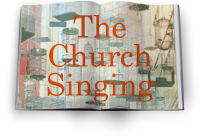Rediscovering Jesus’ Hymnbook
How interested would you be if archaeologists unearthed a hymnbook embossed with the name, “Jesus of Nazareth”? Overlooking the anachronism for a moment, wouldn’t “Jesus’ hymnbook” be immediately republished and rocket to the best-seller lists? Wouldn’t those songs find instantaneous popularity in worship services across the globe?
We have that hymnbook. We do know what songs Jesus sang: he sang the psalms.
So a question arises: if you’d be excited about singing the hymns from our fictional archaeological find, then why aren’t you more excited about singing the psalms? Two events in my life significantly nudged me into answering that question.
The first event was a dumbfounded stare in the seminary bookstore when I was a first year M.Div. student. I stood looking at the required reading for New Testament Greek and saw the Trinity Psalter as a required purchase. Why was I being asked to purchase an Old Testament book in English for a New Testament Greek course? It turns out my professor had a habit of beginning each class by requiring his students to sing a psalm together. So I become a psalm singer by requisite.
The second event happened in the Peruvian mountains. I led a group of students on a short-term mission trip. Our task was to dig a ditch around a church under construction. Our Peruvian host was a minister in the Peruvian Presbyterian Church and they mainly sang psalms.
We had a long conversation about why this was their practice, but one reason stood out to me. He was fighting heresy in the churches he pastored. False teaching slipped into his churches through folk songs adjusted for worship. Psalm singing was his attempt to guard his people from heresy sung to a familiar tune. Psalms served that growing community of churches as a biblical bulwark against encroaching syncretism. Reflecting on that conversation, I realized that I had become a psalm singer through missions.
You don’t have to be a seminary student or a missionary to Peru to step into the world of psalm singing. You only need to do two things. First, consider the benefits that God attaches to worship in psalm. Second, decide practically how you will begin singing the psalms.
SIX BENEFITS OF PSALM SINGING
Here then are six benefits of congregational psalm singing.
1. When you sing psalms you literally sing the Bible.
Good hymns are theologically deep, artistically sound, and biblical in content, but they are not the actual words of Scripture. However, when we sing the psalms we are actually singing the Bible. The poetic structure, themes, and content of the psalms are the inspired Word of God for his church in every age.
2. When you sing the psalms you interact with a wealth of theology.
Martin Luther said of the Psalter, “It might well be entitled a Little Bible, wherein everything contained in the entire Bible is beautifully and briefly comprehended.” The 150 psalms cover the waterfront of theology. Psalm singing is theological study.
3. When you sing the psalms you are memorizing Scripture.
An important part of Christian maturity is the ability to recall passages of Scripture at need. Educational circles have long recognized how music aids memorization. This is no accident; it reflects the providential hand of our Creator God. He wants you to memorize his Word and has provided a mnemonic for easy memory—the Psalter as Scripture that was, and should be, set to music.
4. When you sing the psalms you guard against heresy.
Andrew Fletcher said, “Let me write a country’s songs, and I care not who writes its laws.” He was onto something. Songs drive information deep into our hearts. However, this power can be used for ill means. As long as the church has existed, songs have been used to inculcate heresy. Psalms are counter-heresy measures.
5. When you sing the psalms you sing with the full range of human emotion.
Godly anger, heart-wrenching sorrow, dark depression, effulgent joy, honest questioning, and exuberant praise are just a sampling of the emotional range covered by the psalms. Most churches sense the burden of teaching their people how to think. Very few consider their responsibility to teach their people how to feel. The psalms serve as the tutors of our affections.
6. When you sing the psalms you praise the person and work of Jesus Christ.
One of the most misinformed statements a Christian can make against psalm singing is, “I don’t sing psalms because they aren’t about Jesus.” When the earliest Christians wanted to sing about Jesus’ atoning death and glorious resurrection they turned to the psalms. A little stroll through the cross-references in the New Testament should be enough to convince even the staunchest critic that to sing the psalms is to sing of the person and work of Christ.
FOUR STEPS TO BEGIN SINGING PSALMS
If these benefits have piqued your interest, then these four steps should help you begin singing the psalms.
1. Find a Psalter you can sing.
Notice I didn’t simply say, “Find a Psalter.” The best Psalter is the one you actually sing. Different Psalters are suited to different musical abilities. Some set each psalm to a particular tune while others simply provide the suggested meter, allowing you to choose the tune.
Here are a few options:
- The Trinity Psalter (Crown and Covenant) provides a single suggested tune for each psalm and breaks long psalms up into suggested portions.
- The Book of Psalms for Singing or The Book of Psalms for Worship (Crown and Covenant) also suggests tunes for each psalm but provides multiple settings and smaller portions for each psalm taken from different historic Psalters.
- The psalter I use most is The Psalms of David in Metre (Trinitarian Bible Society) developed from the 1650 Scottish Psalter. It provides each psalm in the common meter. While lacking in musical sophistication, this version is immediately singable if you know a handful of common meter tunes like “Crimond” or “Amazing Grace.”
2. Know your Bible.
Devote special study to the background of the psalms. Devote some public teaching and preaching to the psalms. Purchase a Bible with cross-references and note where psalms are quoted in the New Testament.
Let me also add the suggestion that you read a good book on redemptive history, like Vaughn Roberts’ God’s Big Picture or T.D. Alexander’s From Eden to the New Jerusalem. A good foundation in the Bible’s overarching plan of redemption and how it culminates in Jesus Christ is essential to singing the psalms well.
3. To sing the psalms well you must understand how the psalms direct us to the person and work of Jesus Christ.
Many psalms are directly fulfilled in the life and ministry of Jesus. The authors of the New Testament regularly draw on the psalms to describe what was accomplished on the cross. The beauty of the psalms is magnified as they are placed in the setting of God’s redemptive work in Jesus Christ.
4. The fourth thing you and your congregation will need is the willingness to try something new.
Psalm singing can be difficult for someone who has never been exposed to it. Psalm singing can be downright alien for someone who has only known modern praise songs. But the potential benefits are immense. It is not easy work but it is good work. It is not quick work but it provides long-term, lasting joys. And the question really is, “Why wouldn’t you want to sing the psalms?”









